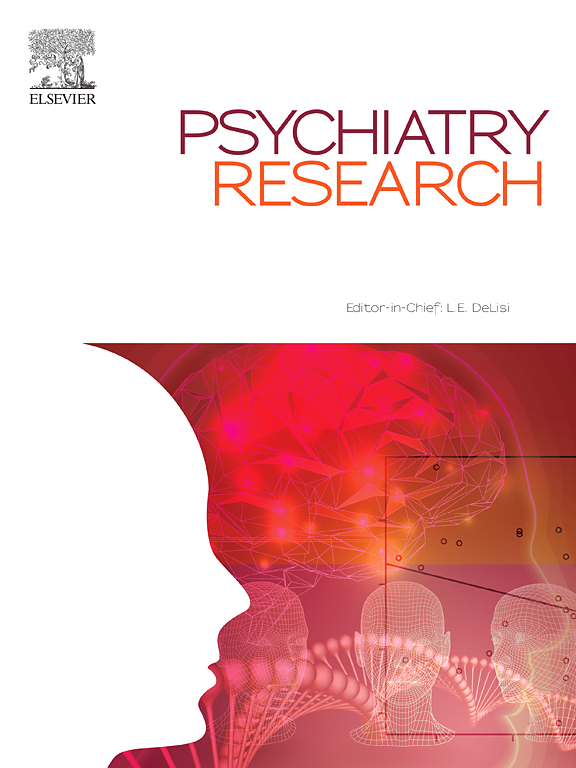Risk for avoidant/restrictive food intake disorder and related variable in Latin America
IF 3.9
2区 医学
Q1 PSYCHIATRY
引用次数: 0
Abstract
Background: Avoidant/Restrictive Food Intake Disorder (ARFID) is a chronic childhood eating disorder whose recent inclusion in diagnostic manuals reflects the growing burden of feeding disturbances. This study examined baseline predictors of ARFID risk in Colombian children and tested their predictive value at six-month follow-up. Methods: Caregivers of 101 children aged 5–8 years completed the EDY-Q (ARFID risk), CBCL 4–18 (child emotional and behavioral symptoms), PHQ-9 (caregiver depression), PAFAS (parenting/family adjustment), and a question regarding active play frequency. At six-month follow-up, ARFID risk was reassessed. Two multiple linear regressions were conducted: (1) baseline ARFID risk regressed on 17 variables; (2) follow-up ARFID risk regressed on baseline ARFID risk plus significant predictors from Model 1. Results: Model 1 explained 46.8 % of baseline ARFID risk variance (p < 0.001). Significant predictors were child Somatic Complaints (β = 0.351, p = 0.017), caregiver Anxiety-Depression (β = –0.277, p = 0.018), and Parent-Child Relationship quality (β = 0.297, p = 0.001). Model 2 explained 74.4 % of follow-up ARFID risk variance (p < 0.001). Only baseline ARFID risk (β = 0.828, p < 0.001) and Somatic Complaints (β = 0.187, p = 0.009) remained significant. Conclusion: Baseline somatic complaints and prior ARFID risk robustly predict future ARFID risk, whereas caregiver anxiety/depression and parent-child relationship quality do not predict longitudinally. Early identification of somatic symptoms alongside ARFID screening may inform targeted interventions to reduce long-term risk.
拉丁美洲回避/限制性食物摄入障碍的风险及相关变量
背景:回避/限制性食物摄入障碍(ARFID)是一种慢性儿童饮食障碍,其最近被列入诊断手册反映了进食障碍日益增加的负担。这项研究检查了哥伦比亚儿童ARFID风险的基线预测因素,并在6个月的随访中测试了它们的预测价值。方法:101名5-8岁儿童的照顾者完成了eddy - q (ARFID风险)、CBCL 4-18(儿童情绪和行为症状)、PHQ-9(照顾者抑郁)、PAFAS(父母/家庭适应)和主动游戏频率的问卷调查。在6个月的随访中,重新评估ARFID风险。进行了两个多元线性回归:(1)基线ARFID风险对17个变量进行回归;(2)随访ARFID风险回归于基线ARFID风险加上模型1的显著预测因子。结果:模型1解释了46.8%的ARFID基线风险方差(p <;0.001)。显著预测因子为儿童躯体抱怨(β = 0.351, p = 0.017)、照顾者焦虑抑郁(β = -0.277, p = 0.018)和亲子关系质量(β = 0.297, p = 0.001)。模型2解释了74.4%的随访ARFID风险方差(p <;0.001)。仅基线ARFID风险(β = 0.828, p <;0.001)和躯体抱怨(β = 0.187, p = 0.009)仍然显著。结论:基线躯体抱怨和先前ARFID风险强有力地预测未来ARFID风险,而照顾者焦虑/抑郁和亲子关系质量不能纵向预测。早期识别躯体症状和ARFID筛查可能为有针对性的干预提供信息,以降低长期风险。
本文章由计算机程序翻译,如有差异,请以英文原文为准。
求助全文
约1分钟内获得全文
求助全文
来源期刊

Psychiatry Research
医学-精神病学
CiteScore
17.40
自引率
1.80%
发文量
527
审稿时长
57 days
期刊介绍:
Psychiatry Research offers swift publication of comprehensive research reports and reviews within the field of psychiatry.
The scope of the journal encompasses:
Biochemical, physiological, neuroanatomic, genetic, neurocognitive, and psychosocial determinants of psychiatric disorders.
Diagnostic assessments of psychiatric disorders.
Evaluations that pursue hypotheses about the cause or causes of psychiatric diseases.
Evaluations of pharmacologic and non-pharmacologic psychiatric treatments.
Basic neuroscience studies related to animal or neurochemical models for psychiatric disorders.
Methodological advances, such as instrumentation, clinical scales, and assays directly applicable to psychiatric research.
 求助内容:
求助内容: 应助结果提醒方式:
应助结果提醒方式:


